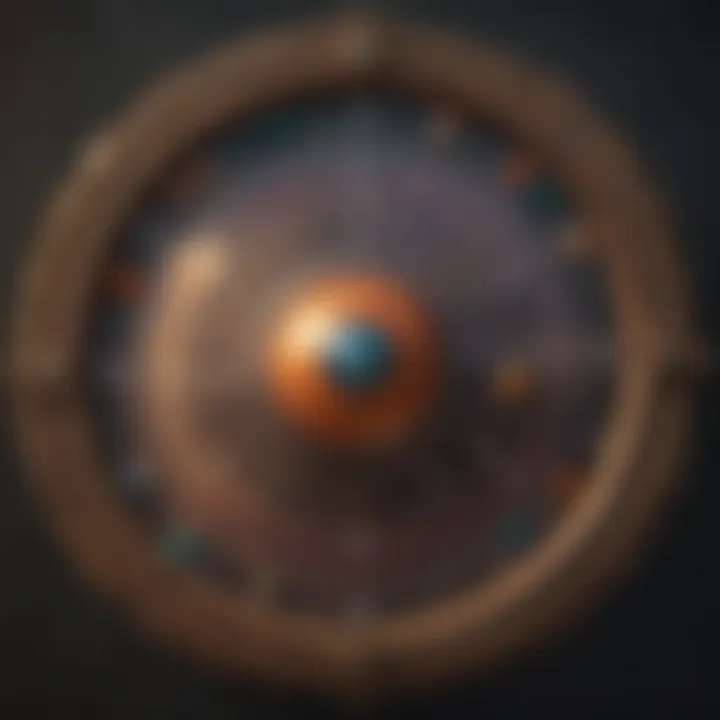Vedic Birth Chart Analysis: Unraveling Cosmic Influences


Intro
Vedic astrology serves as a profound tool for understanding one's self in relation to the cosmic order. By examining the Vedic birth chart, individuals can gain insights into their life paths, personality traits, and even challenges they might face. The foundational knowledge of planetary positions and house systems becomes vital; this article aims to unpack these intricate details.
Astrology holds a mirror to our lives, guiding us through the complexities of human behavior. It offers a bridge between celestial influences and our individual experiences. Understanding your Vedic birth chart is not simply an exercise in mapping; it’s a journey into self-discovery that allows for personal growth and informed decision-making.
Zodiac Profiles
Overview of Each Sign
In Vedic astrology, there are twelve zodiac signs, each corresponding to specific traits and energies. Each sign has its unique characteristics and influences. The twelve signs are:
- Aries
- Taurus
- Gemini
- Cancer
- Leo
- Virgo
- Libra
- Scorpio
- Sagittarius
- Capricorn
- Aquarius
- Pisces
Personality Traits
Each zodiac sign encapsulates a breadth of personality traits. Here are some notewrothy examples:
- Aries: Driven and competitive, often taking initiative and displaying strong leadership.
- Taurus: Grounded and reliable, with a penchant for comfort and material stability.
- Gemini: Inquisitive and adaptable, excelling in communication and often restless in nature.
Each sign not only depicts inherent strengths but also sheds light on potential weaknesses. These traits stem from planetary rulership and the elemental compositions of each sign.
Strengths and Weaknesses
Understanding strengths and weaknesses provides clarity to one’s character. For instance:
- Leo: Creativity is a strength, but pride may lead to conflicts in relationships.
- Scorpio: Intensity and loyalty can be seen as strengths; however, jealousy might cloud judgment.
By evaluating these traits, individuals can leverage their strengths and work on their weaknesses for personal evolution.
Compatibility Insights
Love and Relationships
Examining compatibility through Vedic astrology involves looking at the positions of Venus and Mars among others. Romantic relationships can thrive with awareness of these influences. For example, a Taurus paired with a Virgo may find harmony due to shared values.
Friendship Compatibility
Friendships formed under similar elemental signs, like earth or fire, tend to be more harmonious. Compatibility dynamics can significantly affect social structures. How the zodiac signs align can dictate the intensity and longevity of friendships.
Workplace Dynamics
In a professional context, knowing the astrological compatibility among colleagues can enhance teamwork. A Capricorn's ambition might balance well with a communicative Gemini. Understanding these dynamics can foster a collaborative work environment.
Astrological Events
Monthly/Weekly Horoscope Breakdown
Regular horoscope readings offer insights into personal development. The timing of celestial alignments can prompt self-reflection and preparedness.
Notable Celestial Events
Celestial events such as eclipses and retrogrades warrant attention. These can initiate significant changes and should be observed closely.
How to Prepare for Astrological Shifts
Preparation for astrological shifts involves setting intentions and being open to transformation. Comprehending these events can guide individuals in navigating their lives with awareness and purpose.


Preface to Vedic Birth Chart Analysis
Understanding Vedic birth chart analysis presents a unique approach to astrology, distinguishing it through its historical roots and specific methodologies. This analysis serves as a profound tool for personal insight, guiding individuals in recognizing patterns and influences that may shape their lives. The principles of Vedic astrology are not merely theoretical but offer practical applications that can facilitate personal growth and informed decision-making.
Definition of Vedic Astrology
Vedic astrology, also known as Jyotish, is an ancient system derived from the Vedas, which are the sacred texts of India. It emphasizes the relationship between celestial bodies and human existence. It interprets how the positions of the planets at the time of one's birth can affect one's personality traits, life events, and overall life path. This system takes into account the lunar zodiac, also known as the Nakshatras, and provides a more individualized chart than Western astrology.
Historical Context and Evolution
Vedic astrology has a rich history that dates back thousands of years. Its earliest references can be found in the Rig Veda, one of the oldest known texts in human history. Over time, the techniques and practices have been refined and adapted, influenced by various cultures and philosophical systems.
The evolution of Vedic astrology reflects a blend of scientific inquiry and spiritual understanding. It has evolved from mere prediction into a comprehensive system of guidance aimed at enhancing personal well-being. Today, interest in Vedic astrology has grown globally, as many seek to explore its insights and apply them to modern life challenges. This ongoing evolution continues to enrich our understanding of this complex and nuanced field.
The significance of Vedic birth chart analysis lies not just in predictions, but in the empowerment it offers individuals to understand their intrinsic nature and navigate life's challenges.
Understanding the Birth Chart Structure
Understanding the structure of a Vedic birth chart is crucial for anyone interested in astrology. It lays the foundation for interpreting the various influences in an individual's life. Each element of the birth chart has a specific meaning and role in astrological analysis. Recognizing the framework allows practitioners to make sense of how celestial positions relate to personal characteristics and life events.
Components of the Vedic Birth Chart
The Vedic birth chart, also known as the Janam Kundali, consists of several key components. These include the nine planets, twelve zodiac signs, and the twelve houses. Each part holds significance in reflecting the potentials and challenges a person might encounter.
- Planets: There are nine primary celestial bodies, including the Sun, Moon, Mars, Mercury, Jupiter, Venus, Saturn, and the two lunar nodes - Rahu and Ketu. Each planet influences distinct aspects of life, from one's emotional state to career prospects.
- Zodiac Signs: There are twelve zodiac signs in Vedic astrology, each carrying specific traits that can affect personality and behavior. The placement of planets in these signs gives deeper insight into an individual's characteristics.
- Houses: The twelve houses represent different areas of life like relationships, career, and spirituality. The planets positioned within these houses reveal how these aspects interact with the individual's experiences.
Understanding these components enables a more nuanced interpretation of the birth chart and its relevance to life experiences.
The Twelve Houses in Vedic Astrology
Each house in the Vedic birth chart holds specific significance. The first house, for example, represents the self and is known as the Ascendant or Lagna. As one moves through the houses, each reflects a different part of life. Here is a brief description of each house:
- First House (Self): Identity and physical appearance.
- Second House (Wealth): Financial security and possessions.
- Third House (Communication): Communication skills and relationships with siblings.
- Fourth House (Home): Roots, family, and emotional foundations.
- Fifth House (Creativity): Creativity, love affairs, and children.
- Sixth House (Health): Work, health issues, and service to others.
- Seventh House (Partnership): Marital relationships and business partnerships.
- Eighth House (Transformation): Transformation, joint resources, and inheritances.
- Ninth House (Philosophy): Higher education, spirituality, and long-distance travel.
- Tenth House (Career): Career, reputation, and public life.
- Eleventh House (Friendships): Friendships, social networks, and aspirations.
- Twelfth House (Subconscious): Isolation, spirituality, and liberation.
This distinctive arrangement enables astrologers to analyze an individual’s tendencies and potential life paths in depth.
The Significance of Zodiac Signs
Zodiac signs are not just a cultural reference; they play a fundamental role in Vedic astrology. Each sign is connected to specific personality traits and energies. Understanding these can significantly enhance the interpretation of the birth chart.
- Aries: Initiative, energy, and impulsiveness.
- Taurus: Stability, security, and sensuality.
- Gemini: Communication, adaptability, and duality.
- Cancer: Emotion, nurturing, and intuition.
- Leo: Leadership, creativity, and self-expression.
- Virgo: Detail-oriented, analytical, and service-minded.
- Libra: Balance, partnership, and harmony.
- Scorpio: Intensity, mystery, and transformation.
- Sagittarius: Adventure, philosophy, and optimism.
- Capricorn: Discipline, structure, and ambition.
- Aquarius: Innovation, independence, and humanitarianism.
- Pisces: Compassion, spirituality, and sensitivity.
Each zodiac sign's placement at the time of birth creates layers of meaning that influence an individual’s character and life experiences, reinforcing the interconnectedness of cosmic events and personal destiny.
Planets and Their Influences
The role of planets in Vedic astrology is central to understanding how celestial bodies influence human lives. Each planet carries a distinct energy and significance that shapes personality traits, challenges, and life experiences. A thorough analysis of these influences enriches the interpretation of a birth chart, giving individuals insights into their paths, decisions, and interpersonal relationships.
Role of Planets in Vedic Astrology
In Vedic astrology, there are nine main planets: Sun, Moon, Mars, Mercury, Jupiter, Venus, Saturn, Rahu, and Ketu. Each planet represents different aspects of life and aspects of human personality. The Sun, for example, symbolizes core identity and self-expression, whereas the Moon is connected to emotions and intuition.
The placement of these planets in specific houses of the birth chart indicates how their energies manifest. For instance, a strong placement of Jupiter can suggest abundance and growth, while a poorly placed Saturn may indicate struggles with authority or limitations. This differentiation in planetary energy can serve as a mirror to one's strengths and weaknesses.
Exaltation and Debilitation of Planets
Exaltation refers to the position of a planet in a sign where its energy is strongest, leading to positive manifestations. For example, the Moon is exalted in Taurus, providing emotional stability and nurturing qualities. Conversely, debilitation occurs when a planet is in a sign where its energy is weakened. Mars, for instance, is debilitated in Cancer, often causing conflict and indecision in areas related to action and aggression.
Understanding exaltation and debilitation adds a layer of complexity to the birth chart interpretation. It allows astrologers to evaluate both the positive and negative influences of planets in someone’s life, facilitating personal awareness. This knowledge can guide individuals to navigate challenges while embracing their strengths more effectively.


Planetary Periods (Dashas)
One of the fascinating aspects of Vedic astrology is the system of planetary periods, known as Dashas. This system analyzes how different planets exert their influences over a person's life during specific time frames. The most commonly used Dasha system is the Vimshottari Dasha, which divides life into cycles of different planetary influences.
Each Dasha is associated with particular planetary characteristics; for instance, during a Jupiter Dasha, individuals may experience growth, optimism, and good fortune. In contrast, a Saturn Dasha may invite more challenges and lessons in discipline or responsibility.
Understanding these periods provides essential context for life events and evolving circumstances. It equips individuals with the foresight necessary to recognize opportunities and prepare for potential challenges.
A deeper understanding of planetary influences can lead to enhanced personal insight and informed decision-making in daily life.
This exploration into planetary influences combines to create a well-rounded perspective on how Vedic astrology can support individuals in their journey of personal development.
Techniques for Analyzing Vedic Birth Charts
Analyzing Vedic birth charts is a crucial aspect of Vedic astrology. It involves understanding the intricate positions of celestial bodies and how these influence human experiences. The techniques used in this analysis provide not just insights into personal behavior but also potential life paths. Knowing these techniques enhances one's ability to interpret charts accurately, yielding practical benefits.
Interpreting Planetary Positions
Planetary positions are the foundation of Vedic astrology interpretation. Each planet holds unique significances based on its placement in different houses and signs. For example, the Sun represents the self and authority, while the Moon relates to emotions and mind.
- House Placement: The house in which a planet resides defines the area of life it influences. If Mars is placed in the 10th house, it may signify a strong drive for career success.
- Sign Influence: The zodiac sign in which a planet is located modifies its expression. Venus in Taurus, for instance, indicates a refined approach to love and aesthetics.
- Degrees and Aspects: The exact degrees and relationships between planets (aspects) offer additional layers of meaning. For example, if Saturn aspects the Moon, there may be emotional challenges to navigate.
This technique requires both analytical skills and intuition. Astrologers must consider many variables to arrive at a well-rounded interpretation. A unique blend of theory and practice is vital for accurate readings.
Aspects and Conjunctions
Aspects, the angular relationships between planets, also play a significant role in chart analysis. They determine how planets interact, which can significantly shape individual characteristics and life events.
- Major Aspects: These are the most commonly considered angles, such as conjunctions, squares, and trines. A conjunction occurs when two planets are very close together, amplifying their qualities. For example, a conjunction of Jupiter and Venus can enhance creativity and optimism.
- Minor Aspects: While less commonly discussed, minor aspects can also provide insights. They may indicate challenges or nuanced influences in a birth chart.
Overall, understanding aspects and conjunctions allows astrologers to see how energies combine or conflict within the chart. It is essential to grasp both the positive and negative implications, ensuring a balanced perspective.
Transits and Their Impacts
The analysis of transits involves observing the movement of planets in the sky as they relate to the natal chart. These movements create energy shifts that can greatly affect individual experiences.
- Timing: Transits can indicate critical periods for change and growth. For instance, when Saturn transits into a significant house in one's natal chart, it might signal a time of hard work and discipline.
- Theme Exploration: Each planet brings its themes into the transit dynamics. Pluto, for example, might bring issues surrounding power and transformation.
- Personal Relevance: The impact of a transit can vary greatly between individuals. An experienced astrologer will assess how a specific transit interacts with the chart's unique structure.
Transits provide a moving picture of the evolving influence of the planets. They are essential for forecasting possible events and understanding current challenges. This technique enriches the understanding of life phases in the Vedic astrology framework.
Understanding these techniques gives one a comprehensive lens through which to view life's cycles and changes, affirming the relevance of astrological insights in personal development.
Practical Applications of Vedic Birth Chart Analysis
The practical applications of Vedic birth chart analysis extend far beyond mere curiosity. Understanding one's birth chart can aid in various aspects of life, offering valuable insights and guidance. The profound nature of Vedic astrology finds its strength in its ability to provide clarity in personal development, enhance relationship compatibility, and offer direction in career paths and financial decisions.
Personal Development and Growth
Engaging with one's Vedic birth chart can serve as a tool for personal growth. The chart reveals strengths and weaknesses inherent in an individual's character. By analyzing these components, one can identify areas to focus on for self-improvement. This self-awareness is crucial in achieving emotional resilience and mental clarity, fostering overall well-being.
Individuals can observe karmic lessons and patterns indicated in their charts, guiding them toward greater self-understanding. Vedic astrology emphasizes the importance of specific planetary influences on personality traits, thereby assisting individuals in their journeys of personal development.
Relationship Compatibility Insights
A relevant application of Vedic astrology is in the realm of relationships. By comparing the birth charts of two individuals, it is possible to discern compatibility levels. This analysis examines the planetary positions in both charts, highlighting potential areas of harmony and conflict.
Astrological compatibility assessments reveal how well partners will communicate, resolve conflicts, and support each other's growth. Additionally, they can shed light on past connection patterns or challenges that may arise in future relationships. This understanding allows individuals to make informed choices about their partners and ultimately fosters healthier relationships.
Career and Financial Guidance


Vedic astrology can provide significant insights regarding career paths and financial decision-making. The birth chart can highlight inherent talents and inclinations, guiding individuals toward professions where they can thrive. Certain planetary placements may indicate a natural affinity for particular fields, whether it be art, science, business, or service.
Furthermore, an analysis of the second house can reveal financial tendencies, helping individuals understand their attitudes towards wealth and investments. Insights may also help strategize timing for career moves or financial investments based on astrological transits.
Limitations and Challenges of Vedic Astrology
Understanding the limitations and challenges of Vedic astrology is crucial for practitioners and enthusiasts alike. It allows one to approach this ancient system with a balanced perspective. While Vedic astrology can offer profound insights into individual behavior and life events, it is important to recognize that it is not without its flaws.
Interpretational Ambiguities
One of the main challenges in Vedic astrology lies in interpretational ambiguities. Astrology is a subjective field. Different astrologers may provide varying interpretations of the same chart. Factors like individual experience, cultural background, and personal belief systems influence how charts are read. For example, a planet in a particular house may signify one thing to one astrologer but something entirely different to another.
Moreover, the complex interplay between planets, houses, and aspects can lead to confusion. Clients often expect definitive answers, but the reality is more nuanced. Predictions can be vague, and generalizations often lead to misinterpretation. Being aware of these ambiguities helps individuals stay grounded and cautious in their pursuits of astrological guidance.
Cultural Variations in Astrological Practices
Cultural differences also pose significant challenges in Vedic astrology. Various cultures have their own frameworks and interpretations that can differ greatly. For instance, the views on planetary influence and timing can vary between Western astrology and Vedic astrology. Different cultures may prioritize different celestial bodies or may have unique methods for calculation.
Consequently, someone derived from a culture that centers around Western practices may find it challenging to adjust to the principles of Vedic astrology. This cultural dissonance can potentially lead to miscommunication or misunderstanding regarding astrological predictions. Therefore, it is essential for practitioners to be culturally sensitive and aware of these variations.
Ethical Considerations in Vedic Astrology
Finally, ethical considerations in Vedic astrology warrant careful examination. As astrologers often wield significant influence over their clients' decisions, a clear ethical framework is essential. Misuse of astrological insights can lead to manipulation or exploitation.
Furthermore, the reliance on astrological predictions can hinder personal agency. Individuals seeking guidance may become overly dependent on astrology, neglecting their own decision-making abilities. These ethical dilemmas can undermine the integrity of astrological practices, making it essential for practitioners to maintain a responsible approach while ensuring transparency with clients.
“Astrology must be viewed not as an absolute guiding force but as a tool for self-reflection and personal growth.”
Future Directions in Vedic Study
As Vedic astrology continues to evolve, examining its future directions becomes essential. The integration of modern technology and the emergence of new research trends indicate a transformation in how practitioners and enthusiasts engage with this ancient knowledge.
Integrating Modern Technology
The integration of modern technology into Vedic astrology offers numerous advantages. Software tools can simplify chart calculations, enabling astrologers to analyze birth charts with precision and speed. This shift allows practitioners to focus more on interpretation rather than manual computation. Various applications exist today that allow users to generate their Vedic birth charts with just a few clicks. These tools can also provide instant compatibility reports for relationships or career insights.
Moreover, online platforms facilitate the exchange of knowledge among practitioners globally. Forums and social media networks, such as Facebook and Reddit, allow for discussions on new findings, techniques, and interpretations. This connectedness fosters a collaborative learning environment, expanding the resources available for those studying astrology.
Research Trends in Astrology
Research trends in astrology are evolving as well. There is an increased interest in empirical studies that seek to validate astrological claims. Academics and researchers are starting to investigate the correlations between Vedic astrology and psychological factors, exploring how celestial influences may relate to personality traits or life choices. This trend can potentially lend scientific credibility to the field, attracting individuals who typically approach astrology with skepticism.
Astrologers are also focusing on interdisciplinary approaches. Collaborating with experts in psychology, sociology, and even neuroscience can enhance the understanding of astrological principles. Such collaborations may help to unravel the complex relationships between celestial phenomena and human experiences.
In summary, the future of Vedic astrology looks promising. Integrating modern technology and pursuing rigorous research can lead to a deeper comprehension of how astrology functions and its relevance in contemporary society. As practitioners embrace these changes, they can enrich their practice and contribute to a more sophisticated understanding of Vedic astrology.
Closure
Summarizing Key Insights
In this article, we explored the multi-faceted domain of Vedic birth chart analysis. Throughout the sections, we discussed the fundamental principles of Vedic astrology, including the structure of birth charts, the roles of planets, and the significance of houses. We established that understanding these components can lead to valuable insights about one's personality, strengths, and challenges.
Moreover, the techniques for analyzing planetary positions, aspects, and transits illuminated how celestial movements can shed light on critical life events. This knowledge is not merely academic; it is applicable to various aspects of life, including personal growth and relationship dynamics. The limitations of Vedic astrology were also examined, emphasizing the interpretational ambiguities and ethical considerations that practitioners should keep in mind.
As we consider the future directions in Vedic astrology, integrating modern technologies may revolutionize how enthusiasts interpret and utilize astrological data. Our exploration highlights the longevity and adaptive nature of Vedic astrology and its relevance in contemporary society.
The Place of Vedic Astrology in Modern Society
Vedic astrology holds a unique place in modern society. As people seek deeper understanding in an increasingly complex world, astrology offers a framework for interpretation and guidance. Its principles provide a structured response to personal questions about identity, purpose, and relationships.
Many individuals turn to Vedic astrology for support in navigating life challenges and making informed choices. This practice is not confined to a niche audience; it resonates across diverse cultural backgrounds and can bridge gaps between various belief systems.
In an era dominated by technology and material pursuits, Vedic astrology invites self-reflection and a deeper connection to one’s inner self. From online communities to social media platforms like Facebook, discussions about astrological findings and experiences flourish. It reveals that Vedic astrology is not merely a tradition of the past but a living, evolving practice that continues to find relevance today.
In summary, Vedic astrology serves as a guiding star in our quest for clarity amid the uncertainties of life.



